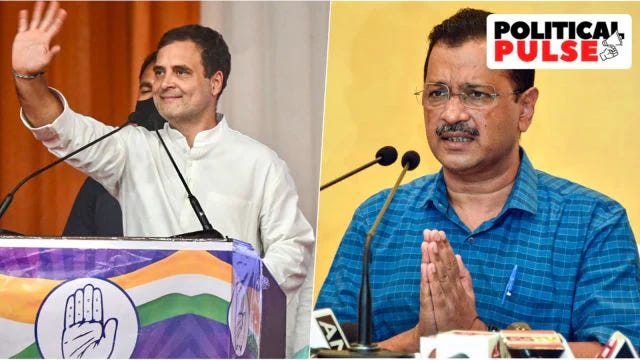Rahul Gandhi's Unyielding Campaign Against Arvind Kejriwal: A Strategic Move for Congress
Gandhi’s fierce critique of Kejriwal and AAP's retaliatory responses may create challenges for future cooperation within the INDIA bloc.
As the campaigning for the Delhi Assembly elections nears its conclusion, Congress leader Rahul Gandhi's outspoken criticism of Arvind Kejriwal and the Aam Aadmi Party (AAP) is poised to complicate the relationship between the two parties at the INDIA bloc’s negotiating table after the elections.
Gandhi's sharp personal attacks on Kejriwal are driven by a calculated effort to boost Congress candidates in Delhi, where the party once ruled from 1998 to 2013 but has since lost its prominence. The Congress leadership, both at the state and central levels, now appears to be aligned in this strategy, which aims to take votes away from AAP in a bid to revive the party’s fortunes in the national capital.
While Gandhi’s initial criticism in his first rally on January 14 focused on the AAP government, his rhetoric has become even more pointed in the second phase of the campaign, with him equating Kejriwal to Prime Minister Narendra Modi, suggesting they are two sides of the same coin.
Congress leaders argue that the BJP has a stable voter base in Delhi, maintaining a vote share between 32% and 38% in recent Assembly elections, which does not significantly overlap with Congress's base. In contrast, AAP has siphoned off most of the Congress support. “Our appeal among the BJP’s voters is limited. Even at our peak, we couldn’t break into their base, and that will remain the case. To regain our relevance, we need to win back the voters who shifted to AAP,” a senior Congress leader explained.
The Congress is now determined to distance itself from AAP, with its leadership acknowledging that engaging with the party no longer serves the party’s interests. Gandhi’s personal grievances with Kejriwal also play a role in this animosity. The AAP's recent attack on Gandhi, branding him as one of the “dishonest” politicians in a campaign poster, intensified tensions between the two parties. In response, Gandhi has accused AAP of corruption and criticized its alleged lack of inclusivity, particularly pointing out the absence of Dalits, backward classes, and religious minorities within the AAP leadership.
A Congress leader emphasized, "The BJP and Congress were traditional opponents in Delhi, and we know how to counter each other. To reclaim power, we need to remove AAP from the equation."
According to internal Congress surveys, the party claims it is making a strong showing in at least six constituencies, with candidates in these areas reportedly in a winnable position. Congress leaders are hopeful that their vote share will exceed the 4.63% they secured in the last election, possibly even reaching double digits.
The AAP’s rise has been a source of deep frustration for the Congress, which sees it as the only regional party to have dethroned Congress in both Delhi and Punjab. Gandhi and many Congress leaders trace their party’s nationwide decline to the rise of AAP, particularly after the Anna Hazare movement in 2011, where Kejriwal played a prominent role. The loss of Delhi to AAP in 2013 marked the beginning of a series of regional defeats for the Congress, including in Punjab, Andhra Pradesh, and Telangana.
During the 2024 Lok Sabha election, when Congress and AAP briefly considered an alliance, Gandhi’s comments about voting for an AAP candidate while Kejriwal supported a Congress nominee in Chandni Chowk highlighted the growing dissonance between the two parties. Even during that time, there were no joint campaign appearances, illustrating the enduring tension.
As the Delhi Assembly election results approach, these bitter exchanges between Gandhi and Kejriwal signal a complex future for any potential collaborations between Congress and AAP within the broader INDIA bloc.


